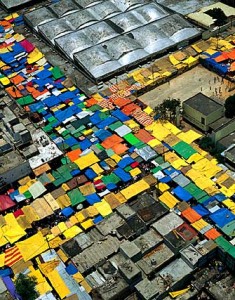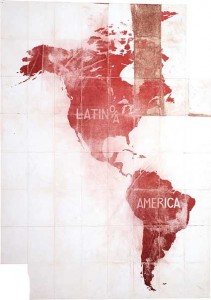 Marina Sitrin, who was part of the original #Occupy foco in Zuccotti Park, wrote a brief essay on “Horizontalism and Territory” drawing from her long-standing engagement with Latin American social movements, particularly those that gained force amid Argentina’s 2001 crash. Her argument is that “horizontal social relationships and the creation of new territory, through the use of geographic space, are the most generalized and innovative of the experiences of the Occupy movement.” Horizontalidad, she explains, emerged as a tenet of political praxis in the various neighborhood assemblies, syndicates of the unemployed, and recuperated (worker-run) enterprises that bubbled up during Argentina’s meltdown. Horizontality centers on non-hierarchical self-organization and collective decision-making—basically, like an #Occupy encampment. Territory is Marina’s other keyword. This reminded me about my discomfort with some state-centric understandings of “territory.” And having been brushing up on some Lefebvre readings, it also got me thinking about how his view of autogestion parallels the way social movements in Latin America talk about and produce territory.
Marina Sitrin, who was part of the original #Occupy foco in Zuccotti Park, wrote a brief essay on “Horizontalism and Territory” drawing from her long-standing engagement with Latin American social movements, particularly those that gained force amid Argentina’s 2001 crash. Her argument is that “horizontal social relationships and the creation of new territory, through the use of geographic space, are the most generalized and innovative of the experiences of the Occupy movement.” Horizontalidad, she explains, emerged as a tenet of political praxis in the various neighborhood assemblies, syndicates of the unemployed, and recuperated (worker-run) enterprises that bubbled up during Argentina’s meltdown. Horizontality centers on non-hierarchical self-organization and collective decision-making—basically, like an #Occupy encampment. Territory is Marina’s other keyword. This reminded me about my discomfort with some state-centric understandings of “territory.” And having been brushing up on some Lefebvre readings, it also got me thinking about how his view of autogestion parallels the way social movements in Latin America talk about and produce territory.
Marina discusses the spatiality of Argentine movements, focusing mainly on the enterprises (factories, hotels, printing presses, etc.) seized and managed collectively by workers. She writes, “Within this space of the workplace, workers speak of the construction of new territories—and by this they are referring to not only the fact that they have occupied a space, but the ways in which they are running the workplaces together, and in solidarity with people from the community and other workplaces. The new territory is created in how they run the workplace, not just in the fact of taking it over.” Marina’s description perfectly matches how Lefebvre conceived of “autogestion,” which is another concept employed by social movements in Latin America (in Spanish: autogestión), particularly those centered on the workplace and the neighborhood.
Autogestion features centrally in State, Space, World, a collection of Lefebvre’s writing in which the editors explain:
Lefebvre also offers a detailed study of the question of autogestion … as a model of grassroots democracy or workers’ control in the context of a wide-ranging analysis of oppositional sociopolitical mobilization in neighborhoods, cities, regions, rural peripheries, national states, and ultimately on a world scale. (Brenner and Elden 2009: 3)
Many Latin American movement groups, particularly in rural areas—from the Zapatistas to the MST—would provide the same definition to autogestion. Ask them about “territory”—a term more often employed—and they might reply, “It’s the same thing.” Or maybe they’d analytically parse it as territory being, dialectically, the space of autogestion. Put more simply, they might say territory is the grassroots control of space.
 My point is that territory and autogestion have become conflated in the praxis and parlance of Latin America’s most dynamic social movements, which I’m writing about in admittedly general terms. But this gets even more interesting when we remember that the understanding of autogestion held by Lefebvre (certainly) and Latin American movements (usually) is anti-statist. Indeed, Lefebvre’s vision of democratic socialism is based on this anti-statist notion of autogestion. Many Latin American movements engage a praxis of territory in this same sort of anti-statist fashion—a tendency partly dulled by Latin America’s leftward statist tilt. Marina draws on the work of Uruguay’s Raúl Zibechi, who makes a similar point.
My point is that territory and autogestion have become conflated in the praxis and parlance of Latin America’s most dynamic social movements, which I’m writing about in admittedly general terms. But this gets even more interesting when we remember that the understanding of autogestion held by Lefebvre (certainly) and Latin American movements (usually) is anti-statist. Indeed, Lefebvre’s vision of democratic socialism is based on this anti-statist notion of autogestion. Many Latin American movements engage a praxis of territory in this same sort of anti-statist fashion—a tendency partly dulled by Latin America’s leftward statist tilt. Marina draws on the work of Uruguay’s Raúl Zibechi, who makes a similar point.
In the final pages of The Production of Space, Lefebvre notes:
What then, of the political status of space? No sooner has space assumed a political character than its depoliticization appears on the agenda [by the state or party machines]. A politicized space destroys the political conditions that brought it about, because the management and appropriation of such a space run counter to the state as well as to political parties; they call for other forms of management—loosely speaking, for ‘self-management’ [autogestion]—of territorial units, towns, urban communities, regions, and so on. (416)
When radical social movements in Latin America think, talk, and act in terms of “territory,” which they do constantly, they dialectically marry autogestion and the kind of politicization of space described by Lefebvre. In their praxis, territory is a space that is autogestionado. Their political tactics and strategies are explicitly and very consciously conceived spatially and at rather awkward angles to, if not against, the state, either because of political orientation or by necessity (or, usually, both). Territory, conceived in this way, has become a central practice and idiom of subaltern political projects in Latin America.

yes! this is what I was trying to get at on the bodies and territories panel at the NY AAG when I was talking about Latin American social movements ‘reclaiming’ the term (and the Ruta’s use of the slogan ‘my cuerpo, primer territorio de paz’). I still think it carries militaristic baggage though – and that those not active in social movements might have very different connotations for ‘territorio.’ que piensas?
Thanks for the comment, Sara. You’re right about the militaristic baggage, particularly in Colombia and presumably other places with long histories of armed conflict, but I suppose that’s one strand in a multifaceted and multiply-situated history (e.g. indigenous people’s longstanding use of the discourse).
I think people not in social movements kind of “get it,” too. In my old neighborhood in Bogotá there was a serial rapist attacking women. We organized ourselves against the violence and the group-name chosen was (without a geographer’s prodding), Reclamando el Territorio (Reclaiming the Territory). We organized a walking group of neighbors to make our presence visible, while rejecting the police-militarization of our neighborhood proposed by authorities, and we also organized “re-signification” events at spots where a rape had occurred among other things. I was surprised by how people didn’t call it a neighborhood, but rather our “territory.” My point is that there’s something intuitive about the term, idea, practice of producing territory. Of course, it can just as easily–and probably more often is–oriented to more nefarious ends. Your point is well taken; it’s complicated.